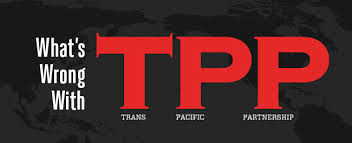You wonder, how can that happen? First of all, the deal is being negotiated among 12 Pacific Rim countries in complete secrecy -- except for those corporate lobbyists. Even members of Congress don't know what they're talking about.
Secondly, Congress will be asked to "fast-track" approval of the TPP, probably in the fall after two more rounds of negotiations. That means lawmakers will have to vote up or down on the deal. They'll have no ability to change it to protect the U.S. dairy farms, dairy workers and consumers likely to be harmed by a flood of dairy products from New Zealand.
CQ Weekly reported on how the TPP undermines democracy:
Lobbyists view trade pacts such as the evolving text of the Trans-Pacific Partnership as a covert tool, a behind-the-scenes way to change domestic laws and regulations they find objectionable. Agriculture interests, food producers, financial service firms and technology and pharmaceutical executives who are closely monitoring the negotiations also must defend against competitors trying to do the same thing.
In short, trade agreements like TPP can morph into yet another forum for U.S. corporate, consumer and environmental interests to fight out their domestic policy squabbles on such matters as food safety and intellectual property rights under a veil of secrecy.Inconsistencies between the TPP agreement on, say food safety standards, might conflict with U.S. law. That could result in a trade dispute resulting in sanctions against the U.S. In the past, the U.S. has revised regulations to comply with trade agreements. Mexico, for example, challenged U.S. regulations on labeling dolphin-safe tuna. Now U.S. tuna is labeled the way Mexico wants, not the way the U.S. government wants.
Some members of Congress are concerned the TPP will lower food safety standards. Food Safety News in November reported:
Congresswoman Rosa DeLauro (D-CT), Senator Mary Landrieu (D-LA) and Congressman Walter Jones (R-N.C.) sent a letter to the Obama Administration Thursday asking that public health be a focus during the negotiations for the Trans-Pacific Partnership (TPP) Free Trade Agreement.
The lawmakers are concerned that, as result of expanded trade with Vietnam and Malaysia – two of the countries included in TPP – the United States could see an influx of imported contaminated seafood. Currently, around 90 percent of the seafood consumed is imported.Similarly, highway safety would have been compromised under NAFTA had the Teamsters not been fighting it. (The current pilot program allowing Mexican trucks to travel U.S. highways has been a failure, with only a handful of carriers participating.) CQ Weekly notes,
The North American Free Trade Agreement that Congress approved in 1993, “downwardly harmonized” federal rules for interstate trucking, says Mike Dolan, the legislative representative who handles trade policy for the International Brotherhood of Teamsters, which complained about NAFTA provisions giving Mexican trucks access to U.S. highways.It's important to talk about the TPP with friends, neighbors and co-workers. A third key to the TPP's secrecy is its low profile. You won't read much about it in the newspaper or on television because powerful corporations don't want you to know about it.
So get talking!

